SHORESIDE: Without The Couch
The SHORESIDE: Without The Couch Podcast is where therapy stops sounding clinical and starts making sense.
Hosted by a therapist, practice owner, and late-diagnosed ADHD woman in midlife, this podcast dives into emotional regulation, relationships, burnout, boundaries, and identity shifts—without the couch, the clipboard, or the pressure to have it all figured out.
This is wellness that talks with you, not at you.
Episodes
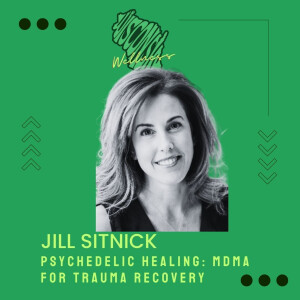
Tuesday Jul 30, 2024
Tuesday Jul 30, 2024
Join our community!WWP NewsletterJoin our WWP Facebook group Jill Sitnick shares her personal journey with MDMA therapy for PTSD and how it helped her heal from childhood trauma. She explains the process of MDMA therapy, which involves preparation, the therapeutic journey, and integration. The therapy allows individuals to reframe traumatic memories and calm their nervous system, leading to healing and a reduction in PTSD symptoms. Jill emphasizes the importance of safety, intentions, and setting in the therapy process. She also highlights the need for repetition and ongoing integration practices to solidify the healing process. In this conversation, Jill Sitnick shares her personal experience with MDMA-assisted psychotherapy for PTSD and discusses the misconceptions and myths surrounding the therapy. She emphasizes the importance of understanding that MDMA therapy is not a cure-all and that it requires ongoing work and integration. Jill also talks about her advocacy work and the resources she has created, including a memoir and a workbook, to help others navigate the therapy. She highlights the need for accurate information and the potential for MDMA therapy to become a widely recognized and accessible treatment for mental health.TakeawaysMDMA therapy can be effective in healing PTSD and reducing symptoms.The therapy involves preparation, a therapeutic journey, and integration.Safety, intentions, and setting are important factors in the therapy process.Reframing traumatic memories and calming the nervous system are key aspects of healing.Ongoing integration practices and repetition are necessary for solidifying the healing process. MDMA-assisted psychotherapy is a healing journey that requires ongoing work and integration.There are many misconceptions and myths surrounding MDMA therapy, such as it being addictive or a cure-all.Accurate information and resources are crucial for understanding the therapy and its potential benefits.Jill Sitnick's advocacy work aims to alleviate the stigma around psychedelics and promote access to MDMA therapy.Research on MDMA therapy is ongoing, and it shows promise for various mental health conditions.For more information on Jill Sitnick:https://thejourneysage.com/ author ofRescuing Jill: How MDMA with a Dash of Mushrooms Healed My Childhood Trauma-Induced PTSDMAPS is a nonprofit organization that provides public resources and leadership as we work together to create legalresponsible evidence-based pathways to psychedelics.https://maps.org/Episode Sponsors and links:Headspace Stress and anxiety are common challenges in today's fast-paced world, and Headspace is there to help. This mindfulness and meditation app provides effective techniques to manage stress, promoting mental well-being.
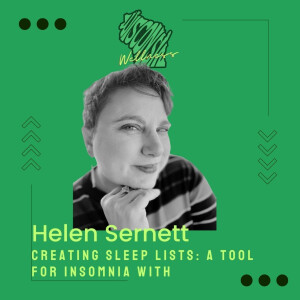
Tuesday Jul 23, 2024
Tuesday Jul 23, 2024
Join our community!WWP NewsletterJoin our WWP Facebook group Helen Sernett, founder of theSleep List Podcast, shares her journey of struggling with insomnia and how she created a podcast to help herself and others fall asleep.She offers a variety of sleep lists, ranging from numbers to the periodic table to presidents of the United States, to provide a soothing and boring experience that helps calm the mind. Helen emphasizes the importance of sleep for overall well-being and how it can improve mood, reduce anxiety, and enhance cognitive abilities. She also discusses the value of pretending to sleep and the restorative benefits it can provide. Sleep is identified as a key pillar of wellness and mental health. Sleep is essential for learning and building new habits. It helps improve muscle memory and allows us to adapt and grow.Napping can be beneficial, especially for shift workers or those with irregular sleep schedules. Napping helps restore the body and allows it to function at a higher level. It's important to listen to your body's signals and prioritize sleep. Lack of sleep can lead to health issues and decreased productivity. Embracing sleep as a sign of self-care and valuing your well-being is crucial.TakeawaysInsomnia affects a significant portion of the population, and finding effective tools to fall asleep is crucial.Sleep lists, such as counting numbers or reciting the periodic table, can provide a soothing and boring experience that helps calm the mind and promote sleep.Pretending to sleep, even if you can't fall asleep, can still have restorative benefits and help reduce anxiety.Sleep is a vital pillar of wellness and mental health, and getting enough quality sleep can improve mood, reduce stress, and enhance cognitive abilities. Sleep is foundational for learning and building new habits.Napping can be beneficial, especially for shift workers or those with irregular sleep schedules.Listening to your body's signals and prioritizing sleep is important for overall health and well-being.Embracing sleep as a sign of self-care and valuing your well-being is crucial.Our Sponsors:Shoreside Therapies:Book afree 15-minute consultation online and get into therapy within a week!Blinkist is a revolutionary app that distills the key insights from thousands of non-fiction books into bite-sized, 15-minute reads or listens. Perfect for busy professionals or curious minds, Blinkist helps you stay informed and inspired without the time commitment of reading full books.Headspace: Stress and anxiety are common challenges in today's fast-paced world, and Headspace is there to help. This mindfulness and meditation app provides effective techniques to manage stress, promoting mental well-being.Thervo : Thervo is an online platform that provides users access to various fitness, nutrition, and wellness professionals. From personal trainers and physical therapists to dieticians and mental health professionals, this versatile platform makes it easy for users to find the right professional for their needs. With its user-friendly search interface, Thervo helps make maintaining optimal health more manageable than ever!
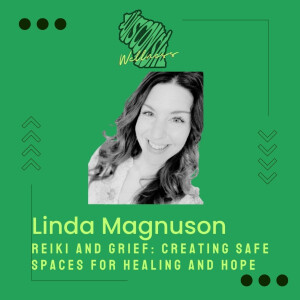
Monday Jul 08, 2024
Monday Jul 08, 2024
Join our community!WWP NewsletterJoin our WWP Facebook group In this conversation, Linda Magnuson andLaurie Groh MS LPC SASdiscuss how Reiki can help with grief. They explore the concept of energy and how Reiki works to move stagnant or negative energy in the body.Linda explains that Reiki provides a safe space for healing and relaxation, allowing clients to process their emotions. She also mentions that Reiki can help clients gain clarity of mind and have aha moments about their grief.The conversation highlights the importance of creating a nurturing environment and allowing clients to express their emotions. In this conversation, Linda Magnuson and Laurie Groh discuss the process of grief and how energy healing can help individuals navigate through it. They explore the different types of losses that can lead to grief, including the loss of a loved one, a relationship, or a sense of self.They also discuss the importance of honoring the past and allowing oneself to grieve. Linda shares her approach to energy healing and how she helps clients move through grief by releasing stuck energy and finding positive aspects in their journey. They emphasize the significance of self-care and finding joy in small things as a way to cope with grief.TakeawaysReiki is a Japanese hands-on healing technique that works with universal life energy to move stagnant or negative energy in the body.Reiki provides a safe space for healing and relaxation, allowing clients to process their emotions.Clients may experience aha moments and gain clarity of mind during Reiki sessions.Creating a nurturing environment and allowing clients to express their emotions is crucial in the healing process. Grief can be experienced in various situations, such as the loss of a loved one, a relationship, or a sense of self.Energy healing can help individuals process grief by releasing stuck energy and finding positive aspects in their journey.Honoring the past and allowing oneself to grieve is an important part of the healing process.Self-care and finding joy in small things can help individuals cope with grief and move towards healing.Shoreside Therapies:Book afree 15-minute consultation online and get into therapy within a week!HeadspaceStress and anxiety are common challenges in today's fast-paced world, and Headspace is there to help. This mindfulness and meditation app provides effective techniques to manage stress, promoting mental well-being.Top 5 books on Grief“When Breath Becomes Air" by Paul Kalanithi"It's OK That You're Not OK: Meeting Grief and Loss in a Culture That Doesn't Understand" by Megan Devine"The Wild Edge of Sorrow: Rituals of Renewal and the Sacred Work of Grief" by Francis Weller"The Orphaned Adult: Understanding and Coping with Grief and Change After the Death of Our Parents" by Alexander Levy"Option B: Facing Adversity, Building Resilience, and Finding Joy" by Sheryl Sandberg and Adam Grant
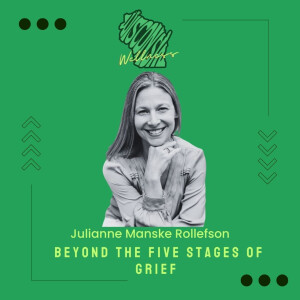
Friday Jun 21, 2024
Friday Jun 21, 2024
Join our community!WWP Newsletter Join our WWP Facebook group This podcast explores the significance of grief education and the Grief Mentor Method with guest Julianne Manske Rollefson, a grief educator and podcast host. Listen as Laurie and Julianne discuss the universal experience of grief, the necessity of acknowledging and processing it in various life changes, and the role of rituals in coping with losses like death, divorce, or job loss. Rollefson introduces a holistic approach to grieving, emphasizing mindfulness, energy management, nourishment, outdoor activities, and the importance of incorporating rituals and rest in navigating grief.TakeawaysGrief is inherent in change and is experienced by everyone at some point in life.There is a lack of education and support around grief in the workplace and society.The five stages of grief model is limited and does not capture the complexity of grief.Acknowledging and understanding grief is essential for providing effective support.Continuing bonds with loved ones who have passed can be a helpful way to navigate grief. Continuing bonds in grief allow for a healthy and ongoing relationship with the deceased in a different way.The Grief Mentor Method, which stands for mindfulness, energy, nourishment, translation, outside, and ritual/rest, provides a comprehensive framework for navigating the grief process.Grief is a complex and multifaceted experience that involves holding multiple emotions simultaneously.Rituals and rest are important components of the grief process, allowing for the integration and honoring of the loss.Grief can be experienced in various contexts, including death, divorce, and job loss, and finding ways to acknowledge and mark these losses is essential.Chapters00:00 Introduction and Background02:58 The Impact of Grief and Loss06:01 The Need for Grief Education in the Workplace11:30 Exploring the Limitations of the Five Stages of Grief20:14 Continuing Bonds: Honoring Loved Ones in Grief21:51 Introduction to Continuing Bonds in Grief30:23 The Grief Mentor Method: Mindfulness, Energy, Nourishment, Translation, Outside, and Ritual/Rest37:09 The Complexity of Grief: Holding Multiple Emotions38:14 Integrating and Honoring the Loss: Rituals and Rest39:06 Grief in Different Contexts: Death, Divorce, and Job LossJulianne Manske RollefsonTo learn more about Julianne and her work, visit www.juliannemankserollefson.com, or follow her on Instagram at @juliannerollefson.Grief Group At Shoreside TherapiesShoreside Therapies:Book afree 15-minute consultation online and get into therapy within a week!
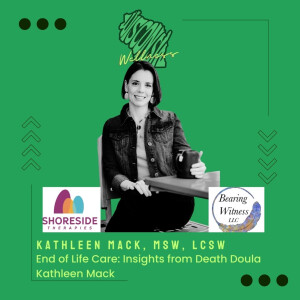
Tuesday Jun 11, 2024
Tuesday Jun 11, 2024
Join our Community:WWP NewsletterJoin our WWP Facebook group In this episode,Laurie Groh MS LPC SASKathleen Mack, MSW, LCSW,a therapist andDeath Doula discusses the role of a death doula and the services they provide for individuals facing terminal illness. She explains that a death doula is an objective person who advocates for the needs of the terminally ill individual, creating a safe space for them to express their wishes and feelings. Kathleen highlights the importance of a death doula in facilitating conversations and processing unresolved issues, as well as assisting with legacy projects and vigil planning. She also emphasizes the role of end-of-life psychotherapy in navigating existential and spiritual concerns. Overall, Kathleen's work as a death doula is a sacred and rewarding experience.TakeawaysA death doula is an objective person who advocates for the needs of the terminally ill individual, creating a safe space for them to express their wishes and feelings.Death doulas assist with legacy projects, facilitating conversations, and processing unresolved issues, providing support and guidance during the end-of-life journey.End-of-life psychotherapy is a valuable service offered by death doulas, helping individuals navigate existential and spiritual concerns.The role of a death doula is to honor the autonomy and dignity of the dying person, providing support and comfort during their final moments.Reach out to Kathleen Mackhttps://www.bearingwitnessmke.comshoresidetherapies.comBook afree 15-minute consultation online and get into therapy within a week!Laurie Groh'sFree Workshops and WorksheetsTop 5 books on Grief“When Breath Becomes Air" by Paul Kalanithi"It's OK That You're Not OK: Meeting Grief and Loss in a Culture That Doesn't Understand" by Megan Devine"The Wild Edge of Sorrow: Rituals of Renewal and the Sacred Work of Grief" by Francis Weller"The Orphaned Adult: Understanding and Coping with Grief and Change After the Death of Our Parents" by Alexander Levy"Option B: Facing Adversity, Building Resilience, and Finding Joy" by Sheryl Sandberg and Adam Grant
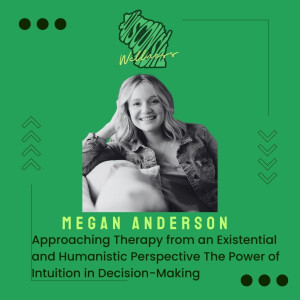
Friday May 31, 2024
Friday May 31, 2024
Join our Community:WWP NewsletterJoin our WWP Facebook group In this episode of the Wisconsin Wellness Podcast, host Laurie Grow interviews Megan Anderson, the founder of Therapist and a Couch. Megan shares her journey of becoming a therapist and her passion for approaching therapy from an existential and humanistic perspective. They discuss the importance of slowing down and paying attention to our intuition, distinguishing it from fear and instinct. Megan emphasizes the need to deeply know ourselves and trust our intuition, even when it feels uncomfortable. They also touch on the role of intuition in the workplace and how it can guide decision-making. In this conversation, Megan Anderson and Laurie discuss the role of intuition in decision-making and problem-solving, particularly in the workplace. They explore how paying attention to our experiences and emotions can provide valuable insights and guide us towards more fulfilling choices. They also discuss the importance of exploring resistance and considering alternative solutions. The conversation emphasizes the need to prioritize self-awareness and reflection in order to strengthen our intuition.TakeawaysApproaching therapy from an existential and humanistic perspective can help clients slow down and deeply know themselves.Intuition is a deep knowing that feels calm, grounded, and wise, while fear and instinct are restless and uncomfortable.Trusting our intuition requires knowing ourselves and embracing discomfort.In the workplace, intuition can guide decision-making and help individuals navigate mental health concerns. Paying attention to our experiences and emotions can provide valuable insights and guide us towards more fulfilling choices.Exploring resistance can help us identify patterns that may no longer be serving us and find new ways to approach challenges.Considering alternative solutions and imagining different outcomes can open up new possibilities and help us make more informed decisions.Prioritizing self-awareness and reflection is essential for strengthening our intuition and making choices that align with our values and desires.TakeawaysApproaching therapy from an existential and humanistic perspective can help clients slow down and deeply know themselves.Intuition is a deep knowing that feels calm, grounded, and wise, while fear and instinct are restless and uncomfortable.Trusting our intuition requires knowing ourselves and embracing discomfort.In the workplace, intuition can guide decision-making and help individuals navigate mental health concerns. Paying attention to our experiences and emotions can provide valuable insights and guide us towards more fulfilling choices.Exploring resistance can help us identify patterns that may no longer be serving us and find new ways to approach challenges.Considering alternative solutions and imagining different outcomes can open up new possibilities and help us make more informed decisions.Prioritizing self-awareness and reflection is essential for strengthening our intuition and making choices that align with our values and desires.For more information on Megan Anderson LPC:https://www.therapistandacouch.com/Episode Sponsors and links:Shoreside Therapies:Book afree 15-minute consultation online and get into therapy within a week!Headspace Stress and anxiety are common challenges in today's fast-paced world, and Headspace is there to help. This mindfulness and meditation app provides effective techniques to manage stress, promoting mental well-being.Blinkist: Learning something new daily is a fantastic practice, especially when combating nerves before a presentation. Blinkist, an app I personally use, offers insightful summaries of various resources. Listening to the summaries of some of my resources helps make me feel more secure in what I am presenting. It helps with my tendency to over-prepare.
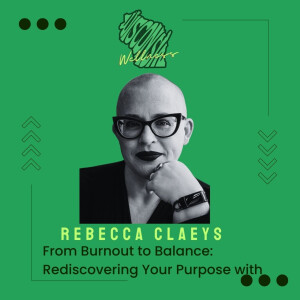
Tuesday May 28, 2024
Tuesday May 28, 2024
Join our Community:Join our NewsletterJoin our WWP Facebook groupIn this episode, host Laurie Groh interviews Rebecca Claeys about burnout and how individuals are feeling increasingly drained. Rebecca shares her perspective on burnout and introduces the concept of the Soul Alchemy Cycle, a framework she developed to work out of burnout and prevent its recurrence. They discuss the societal pressure to tie personal worth to productivity and the challenges of breaking free from this mindset. Rebecca emphasizes the importance of recognizing one's purpose and shifting the focus from doing to being. They also touch on the broader issue of work-life balance and the stress that comes from multiple responsibilities. In this conversation, Rebecca Claeys and Laurie discuss the importance of aligning with one's purpose and values to avoid burnout. They explore the societal pressure to constantly be productive and the need to prioritize self-care and personal fulfillment. Rebecca emphasizes the significance of identifying what truly matters to oneself and using that as a guide for decision-making. They also discuss the role of leaders in creating a culture that supports individual well-being and authenticity. Rebecca provides practical steps for listeners to start implementing these concepts in their own lives.TakeawaysBurnout is a real issue, especially after the COVID-19 pandemic, and it affects individuals across various professions.Treating burnout as a symptom of stress is not enough; there is a need to address the root cause.Many people tie their personal worth to their productivity, which can lead to burnout.Shifting the focus from doing to being and recognizing one's purpose can help in overcoming burnout.Societal pressure and the need to constantly produce contribute to the prevalence of burnout.Finding a balance between work and personal life is crucial in preventing burnout. Aligning with one's purpose and values is crucial to avoid burnout and find fulfillment.Identifying what truly matters to oneself and using it as a guide for decision-making is essential.Leaders play a vital role in creating a culture that supports individual well-being and authenticity.Practical steps include prioritizing self-care, saying no more often, and modeling the desired behavior as a leader.Chapters00:00 Introduction and Pronouns06:15 Tying Personal Worth to Productivity12:32 Finding Purpose and Untethering from Productivity26:43 Using Values as a Guide for Decision-Making35:48 Creating a Culture of Well-being48:07 Practical Steps for Personal AlignmentRebecca Claeys information and freebies!https://www.cleopatrasseeds.com; https://www.facebook.com/rebecca.claeys.author; https://ko-fi.com/rebeccaclaeysauthorLaurie Groh'sFree Workshops and WorksheetsShoreside Therapies:Book afree 15-minute consultation online and get into therapy within a week!HeadspaceStress and anxiety are common challenges in today's fast-paced world, and Headspace is there to help. This mindfulness and meditation app provides effective techniques to manage stress, promoting mental well-being.Top 5 Books on Mental Health, Work and Balance.Designing Your Life: How to Build a Well-Lived, Joyful LifeYes, You Can Talk About Mental Health at Work, Here's Why...and How to Do It Really WellThe Resilience Plan: A Strategic Approach to Optimizing Your Work Performance and Mental HealthConquering Burnout in a Toxic Workplace: Techniques for Transforming Stress and Escaping Anxiety So You Can Stay Motivated and Take Control of Your CareerGet Over 'I Got It': How to Stop Playing Superwoman, Get Support, and Remember that Having It All Doesn’t Mean Doing It All Alone
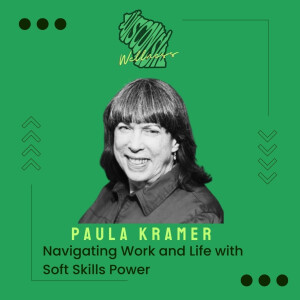
Monday May 20, 2024
Monday May 20, 2024
Join our Community:Join our NewsletterJoin our WWP Facebook group In this episode of the Wisconsin Wellness Podcast, host Laurie Groh MS LPC SAS interviews Paula Kramer, a woman who turned her traumatic childhood experiences into a platform for teaching others about resilience and soft skill power strategies. Having survived two murder attempts by her mentally unstable mother and living through a tumultuous family life, Paula shares how these adversities led her to develop soft skills for positive control in various aspects of life. She speaks about her therapeutic journey to acknowledge and heal from her past traumas, detailing the process of recognizing and responding to the emotional, mental, and physical clues that pointed towards her mother's attempts on her life.Furthermore, Paula discusses her ventures into therapy, the varying effectiveness of therapists, and her subsequent focus on journaling and self-help as mechanisms for recovery. She also highlights the roles of positive self-talk and the impact of bystander intervention in gossip scenarios as tools for personal empowerment. Paula now offers online self-study courses aimed at teaching others how to leverage soft skills for improving their personal and professional lives, drawing from her extensive research on gossip and behavior styles. Her story is a testament to the potential for personal transformation and the power of resilience.00:00 Welcome to the Wisconsin Wellness Podcast00:29 Paula's Harrowing Childhood and Journey to Empowerment06:17 Unraveling the Past: Therapy and Self-Discovery13:45 Finding Safety and Voice: Writing and Speaking Out15:53 The Power of Positive Words and Resilience17:26 Introducing Paula's Courses on Collaboration and Career Advancement18:28 Harnessing Gossip for Positive Outcomes19:02 Empowering Strategies for Career and Relationships19:40 Insightful Course Offerings and Real-Life Applications20:58 A Deep Dive into Gossip: Strategies and Impact22:00 Behavior Styles and Effective Communication24:41 Personal Growth Through Self-Awareness27:35 Transformative Personal Stories and Insights30:50 The Power of Positive Gossip and Connection33:59 Creating Success in Small SpacesGet more information on Paula M. Kramer here:https://softskillstrategycourses.com/https://www.facebook.com/Paula.M.Kramer.Positivity.Promoter/https://www.speakingfromtriumph.com/
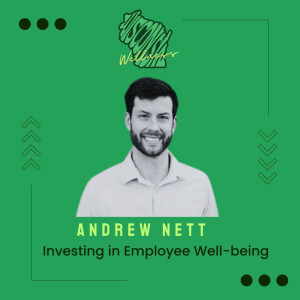
Monday May 13, 2024
Monday May 13, 2024
In this conversation,Laurie Groh and Andrew Nett discuss the importance of destigmatizing mental health and the role of mental health services in the workplace. Andrew Nett, a licensed clinical social worker, shares his experience providing mental health services to employees at Delta Defense.They discuss the challenges and misconceptions surrounding seeking mental health treatment, the benefits of normalizing mental well-being, and the power of therapies like EMDR. They also explore ways to decrease the stigma around mental health, such as offering lunch and learns and group sessions in the workplace. Overall, the conversation highlights the need for organizations to invest in employee well-being and the positive impact it can have on the culture and retention rates.TakeawaysDestigmatizing mental health is crucial for creating a supportive workplace culture.Providing mental health services in the workplace can have a positive impact on employee well-being and retention rates.Challenges and misconceptions around seeking mental health treatment include stigma, fear, and gender norms.Normalizing mental well-being is important for individuals of all ages.Therapies like EMDR can be powerful tools for addressing past traumas and promoting healing.Organizations can decrease the stigma around mental health by offering lunch and learns and group sessions.Investing in employee well-being is beneficial for both individuals and the overall workplace culture.Chapters00:00 Introduction and Background00:28 Providing Mental Health Services in the Workplace03:12 Misconceptions about Seeking Mental Health Treatment07:10 Addressing Uncomfortable Feelings in Therapy09:13 The Role of EMDR in Therapy15:24 Destigmatizing Mental Health in the Community20:29 Promoting Mental Health in the Workplace23:08 Finding Mental Health Services for Organizations26:07 Decreasing Stigma and Increasing Awareness29:27 Conclusion and Final ThoughtsWWP Sponsors:Shoreside Therapies:Book afree 15-minute consultation online and get into therapy within a week!VitalMinds Counseling: Free Workshops and WorksheetsBook Laurie and her team to discuss various mental health issues related to your business.Topics include: Self Compassion, Mentally Healthy Culture, Healthy HabitsBook afree 15-minute consultation online.HeadspaceStress and anxiety are common challenges in today's fast-paced world, and Headspace is there to help. This mindfulness and meditation app provides effective techniques to manage stress, promoting mental well-being.Top 5 Books on Mental Health, Work and Balance.Designing Your Life: How to Build a Well-Lived, Joyful LifeYes, You Can Talk About Mental Health at Work, Here's Why...and How to Do It Really WellThe Resilience Plan: A Strategic Approach to Optimizing Your Work Performance and Mental HealthConquering Burnout in a Toxic Workplace: Techniques for Transforming Stress and Escaping Anxiety So You Can Stay Motivated and Take Control of Your CareerGet Over 'I Got It': How to Stop Playing Superwoman, Get Support, and Remember that Having It All Doesn’t Mean Doing It All Alone
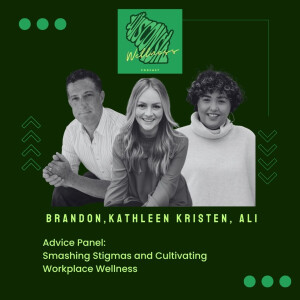
Friday May 03, 2024
Friday May 03, 2024
Join our NewsletterJoin our WWP Facebook group Free Workshops and WorksheetsThe conversation delves into mental health at work, touching on the challenges of work-life balance, especially for new full-time employees. It stresses setting boundaries, self-care, workplace flexibility, and the importance of routines to optimize free time.Strategies for managing depression, reframing negative thoughts, and the role of therapy and medication are explored. The focus is on achieving remission from depression symptoms, prioritizing self-compassion, journaling, and setting small goals to combat cognitive biases. The impact of core beliefs, cognitive work, and communication on mental health is discussed, along with stress management techniques and the need to prioritize well-being over toxic situations.Finding work aligned with personal values, reevaluating goals, and coping with discomfort and stress are key takeaways. Prioritizing self-care, engaging in confidence-boosting activities, and seeking a good fit in the workplace are essential for well-being.TakeawaysBalancing work and personal life requires setting boundaries and prioritizing self-care.Transitioning from school to a full-time job may require an adjustment period.Finding flexibility in the workplace can help manage work-life balance.Having structure and routine can be helpful in managing limited free time. Creating routines and establishing patterns can help regain control and structure in daily life.The goal should be remission from symptomatology, not accepting a low-level depression as a permanent state.Self-compassion, journaling, and setting small behavioral goals can help challenge negative cognitive biases.Depression is influenced by core beliefs and how individuals respond to them.Chapters00:00 Introduction and Discussion of Mental Health in the Workplace02:23 Balancing Work and Personal Life04:17 Managing Depression in the Workplace13:49 Dealing with Discomfort and Stress in a Job that Doesn't Align with Your Values15:44 Reframing Negative Thoughts and Building Self-Confidence25:38 Conclusion and Call to ActionWWP Sponsors:Shoreside Therapies:Book afree 15-minute consultation online and get into therapy within a week!HeadspaceStress and anxiety are common challenges in today's fast-paced world, and Headspace is there to help. This mindfulness and meditation app provides effective techniques to manage stress, promoting mental well-being.Top 5 Books on Mental Health, Work and Balance.Designing Your Life: How to Build a Well-Lived, Joyful LifeYes, You Can Talk About Mental Health at Work, Here's Why...and How to Do It Really WellThe Resilience Plan: A Strategic Approach to Optimizing Your Work Performance and Mental HealthConquering Burnout in a Toxic Workplace: Techniques for Transforming Stress and Escaping Anxiety So You Can Stay Motivated and Take Control of Your CareerGet Over 'I Got It': How to Stop Playing Superwoman, Get Support, and Remember that Having It All Doesn’t Mean Doing It All Alone








